Research Report: 2023
▼ Choose a report:

Powered by Research & Graduate Studies

Powered by Arts and Social Science
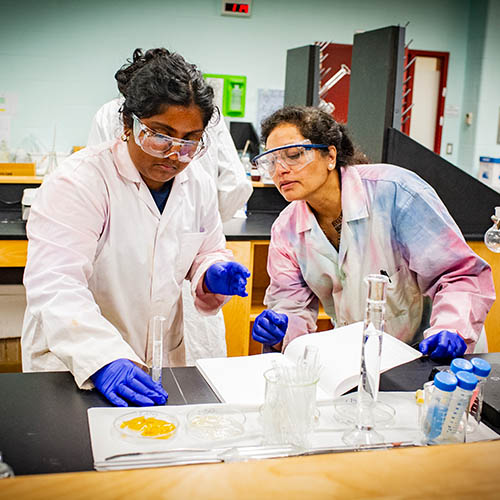
Powered by Science and the Environment
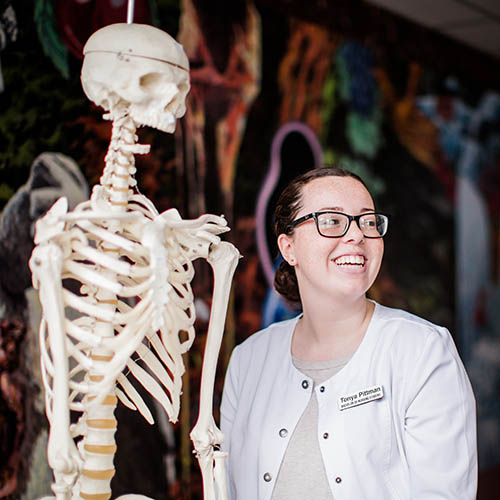
Jump To:
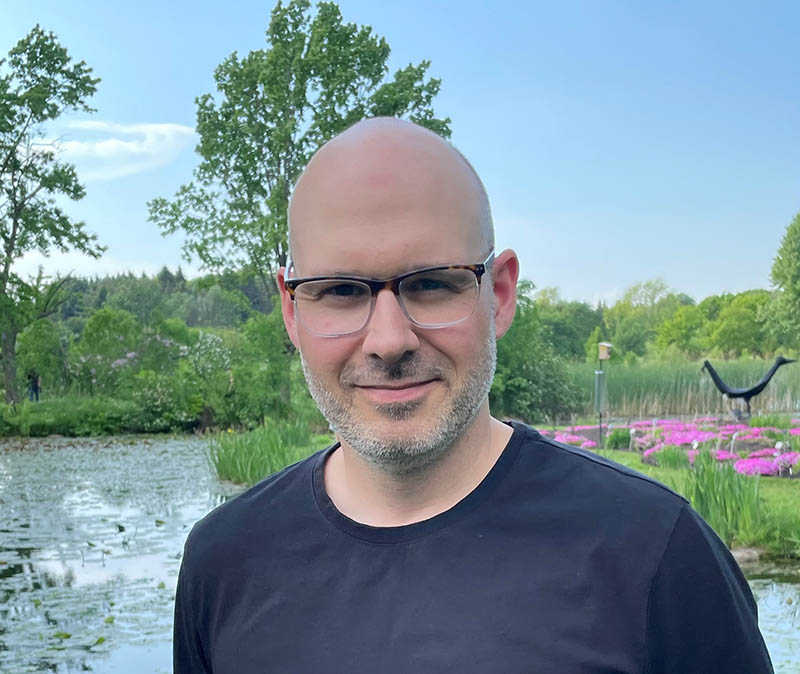
Dr. Joe Bowden, research scientist with the federal Department of Natural Resources and associate professor at Memorial University's Grenfell Campus
We've all heard it — to avoid ticks, wear long pants and a long-sleeved shirt if you're hiking in tall grass. But do we really need to worry about that in Newfoundland and Labrador?
The prevalence of ticks — or the black-legged tick, to be exact — has been minimal in the province, but that will likely change over time, according to the work being done by graduate student Jacob Westcott and his supervisor Dr. Joe Bowden, a research scientist with the federal Department of Natural Resources and associate professor at Memorial University's Grenfell Campus. Believe it or not, the models created by Mr. Wescott and Dr. Bowden take us up to the year 2100.
Using tick records within Canada and the United States between 2017 and 2022 (from eTick and iNaturalist), Mr. Wescott was able to produce "robust, ensemble of ecological niche models."
Of course, the primary instigator is climate change.
"Climate change rapidly drives species range dynamics, prompting many terrestrial organisms to shift northward to higher latitudes and forcing new species-environment and species-species interactions," said Mr. Westcott. "The blacklegged tick has historically been endemic to the United States but is establishing a persistent population in Canada, potentially exposing people to Lyme disease."

Graduate student Jacob Westcott
Key variables in his analysis were temperature, precipitation, biomass production, length of the growing season, climate moisture index, and the number of yearly degree days.
Mr. Westcott's findings highlight the invasive potential of the black-legged tick, with implications for public health and changing ecosystem dynamics.
At a public participation level, eTick is a public platform for image-based identification and population monitoring of ticks in Canada. If you find a tick on yourself or a pet, take a photo, upload it, and scientists like Dr. Bowden will identify the species.
Dr. Bowden has been more and more involved in the continued promotion of the eTick website and app. As one of only a handful of arachnologists in Atlantic Canada, his involvement in helping to identify ticks that are reported is crucial to raising awareness and building confidence in the app.
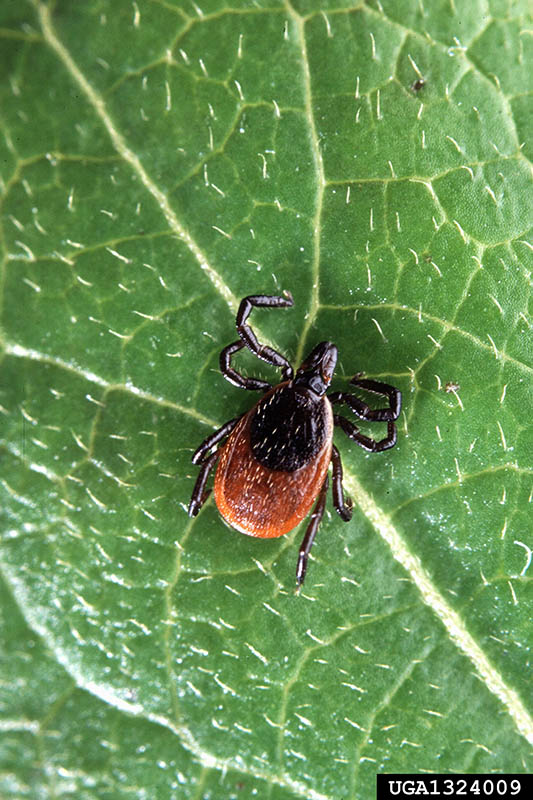
The black-legged tick
While ticks are more often seen on the mainland, ticks can be encountered on the island, particularly from spring to fall, said Dr. Bowden.
"Climate change is driving black-legged ticks rapidly northward at a rate of about 48 km per year," said Dr. Bowden.
Through Ticknet.ca, Dr. Bowden hired 2 students —to conduct "tick dragging" along ten transects (frequently used walking trails) - five in western Newfoundland and five on the east coast of the island.
"They walk on commonly used paths and drag a flannel cloth along the top of grasses," he said, adding the program has been in effect for two years so far. "The good news is they haven't collected a single black-legged tick — yet."
As Mr. Westcott found out in his research, one of the reasons the ticks aren't prevalent in Newfoundland is because the winters are longer. But that's changing. Which is why it's so important that members of the public, veterinarians and doctors contribute data to the eTick app/website.
"The more records, the more accurate the models for where we might see them in the future," said Dr. Bowden.
Title: The Biology of Aging Pillar
Name: Gastonguay Siu
Description: Integrative Machine Learning Approach for Identifying Differentially Methylated CpG Sites in Age-Related Diseases.
Program: PhD (Human Genetics and Genomics)
Name: Emily Hurley
Description: The effect of diet on the aging synapse: a large-scale super-resolution characterization of synaptic nanostructure in the aging mouse brain and the role of dietary intervention.
Program: PhD (Neuroscience)
Title: The Lived Experience of Aging Pillar
Name: Olivia Dutton
Description: The effects of low-gamma (40Hz) multisensory stimulation on clearing of abnormal protein accumulation in brain and the role of dietary intervention
Program: PhD (Psychology)
Title: Aging in Place Pillar
Name: Fadeela Yussif
Description: Intergenerational Learning Initiatives for Community and Natural Resource Sustainability in Newfoundland and Labrador: Exploring the Role of Technology
Program: MA (Environmental Policy)
Name: Sandra Hewitt-Parsons
Description: Longing to belong: Identity and belonging through the contexts of disability and age in rural Newfoundland communities
Program: PhD (Education)
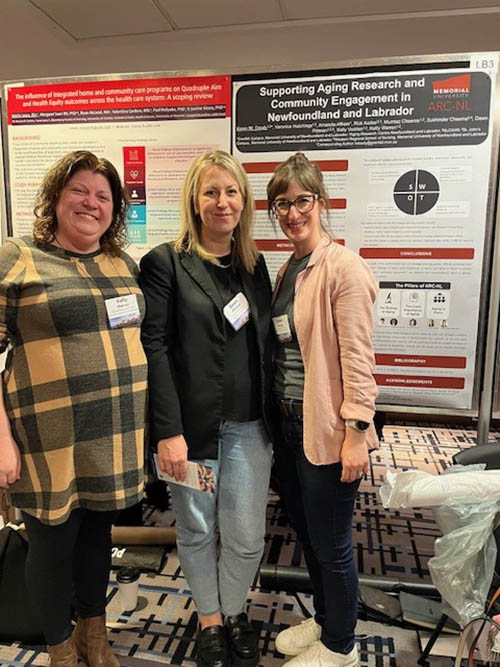
(ARC-NL in engaged research): Dr. Kelly Warren, Nurse Educator Dawn Pittman, and Dr. Karen Doody at an ARC-NL event.
The projects at FFSL aims for comprehensive research of sensory evaluation and chemical investigation for both research and industry purposes, to improve industry and community engagement and access to the research program and facility.
1. Investigation of Nordic brown macroalgae: A sustainable source of functional lipids.
A study of Nordic seaweeds (macroalages) has been conducted with our collaborators from Denmark to investigate brown macroalgae as a sustainable and abundant source of lipids with acknowledged functional and health benefits. In this study, a comprehensive lipidomic analysis was performed in four macroalgae: Saccharina latissima, Fucus vesiculosus, Fucus serratus and the invasive Sargassum muticum, using HILIC-C30RP-HRMS. Neutral lipids (tri-, di-glycerides) comprised 72-82% of total lipids (TL) with a highly unsaturation profile (27-49% depending on species). The polar lipidome comprised glycolipids, phospholipids, betaine lipids and sphingolipids with varied content among macroalgae. S. latissima displayed the greatest level of glycolipids (23% of TL), by contrast with the dominance of long-chain polyunsaturated betaine lipids (10-18% of TL) in the other species, particularly in S. muticum. Phospholipids and sphingolipids were detected in low abundance (<1.7% of TL). This study elevated the potential of brown macroalgae as an emerging reservoir of bioactive lipids with nutritional relevance.
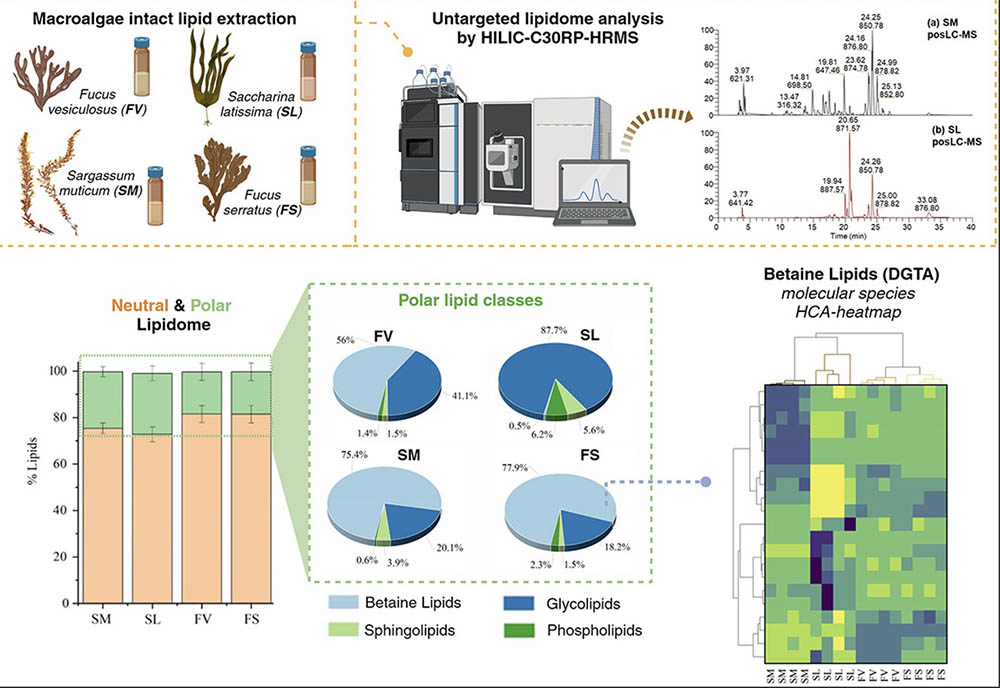
reference: Pham, T. H., Thomas, R., Schwab, C., Martinez, M. M., & Vidal, N. P. (2024). Unraveling the neutral and polar lipidome of Nordic brown macroalgae: A sustainable source of functional lipids. Food Chemistry, 459, 140415. doi:https://doi.org/10.1016/j.foodchem.2024.140415
2. Assessing terpene composition in edible essential oils
Terpenes in essential oils have recently received significant attention due to their potential to improve brain and whole-body health. A deeper understanding of the terpene composition of edible essential oils is important for fully exploring their possible applications. In this paper, a comprehensive study conducted at Functional Foods Sensory Lab (FFSL), Grenfell Campus using four different analytical methods to analyze the terpenes profile identifying a total of 156 terpenes in four essential oils samples: lemongrass oil from Cymbopogon citratus, pimento oil from Pimenta dioica, thyme oil from Thymus vulgaris, and wild basil oil from Clinopodium vulgare.

reference: Nguyen, L. A. M., Pham, T. H., Ganeshalingam, M., & Thomas, R. (2024). A multimodal analytical approach is important in accurately assessing terpene composition in edible essential oils. Food Chemistry, 454, 139792. doi:https://doi.org/10.1016/j.foodchem.2024.139792
3. Completed sensory evaluation and chemical testing service was completed in collaboration with the Government of Newfoundland and Labrador, Department of Fisheries, Forestry and Agriculture.

The sensory survey is to study the consumer acceptance, the palatability in consumer perceptions, their favours and intent to purchase of the corn produced locally. Candice corn was found the most preferred corn variety, and was associated with the highest level of sweetness, juiciness, and creaminess in flavour. It matched with the highest sugar content measured in the same lab, despite the locally common perception that pure yellow corn is not sweet and hard texture which caused the farm having hard time to sell yellow corn. This sensory survey study has contributed to a better understanding of consumer perception and help to change it for a better choice of current local production.
4. Local industry engagement - Partner with Cormack Bee Company Inc.
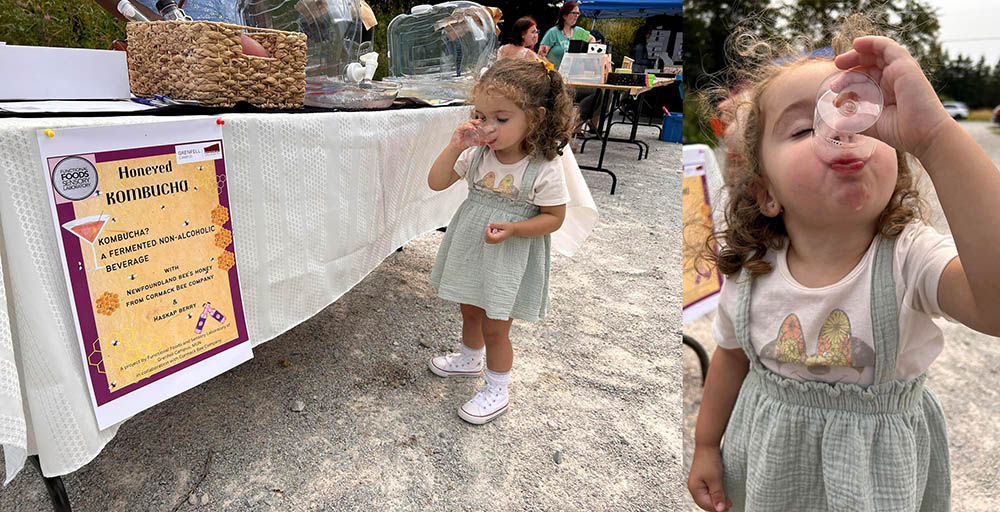
FFSL contributed a Table of Kombucha taste test to 5th-anniversary celebration at Cormack farm in summer August 2024 - Supuni Gamage, PhD candidate in the food science program.2
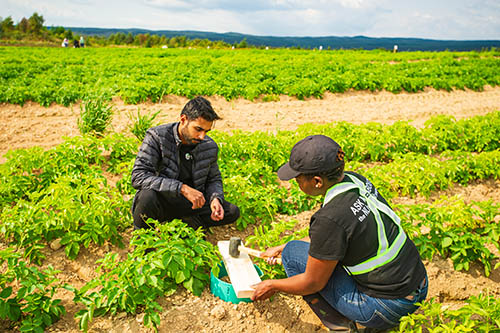
installing PVC collars for sampling GHGs in the potato field
The Agricultural Climate Solutions Living Lab for Newfoundland and Labrador (LL-NL) is a 5-year collaborative research project that brings together producers, scientists, and other industry stakeholders to co-develop beneficial management practices (BMPs) to enhance carbon sequestration and mitigating greenhouse gas emissions. The main partners include the NL Federation of Agriculture (NLFA); Grenfell Campus, Memorial University; Agriculture and Agri-food Canada; and the NL Department of Fisheries, Forestry, and Agriculture (DFFA). All stakeholders work together to conduct on-farm research trials that put farmers at the forefront, involving them at every stage, i.e., experimental design, implementation, and evaluation.
BMPs proposed for the LL-NL were identified following the core principles of the LL innovation approach, which emphasize co-development, working in partnerships, and focusing on farmers' needs. Producers and researchers identified two main BMPs that are the basis for the scientific studies for western LL-NL:
Specifically, the LL-NL project addresses the following objectives:
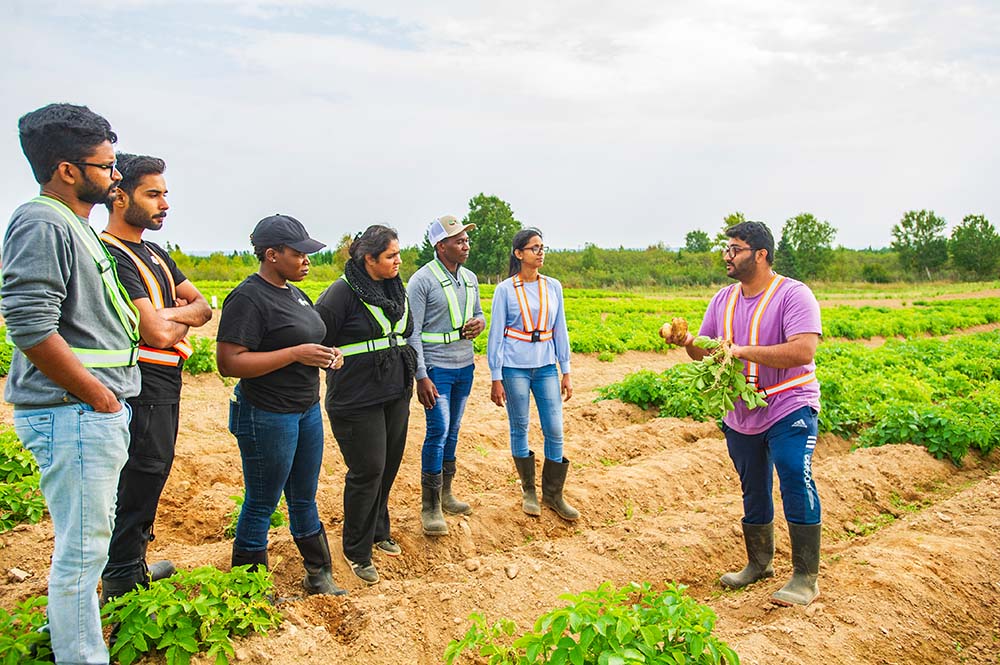
Abdullah Sami (M. Sc. BEAS) discusses impacts of nitrogen fertilizers on potato traits. L - R: Tharindu Kulasinghe, Muhammad Umar, Dr. Yeukai Katanda, Ramisha Azhar, Kelvin Geza, and Bhashitha Konara
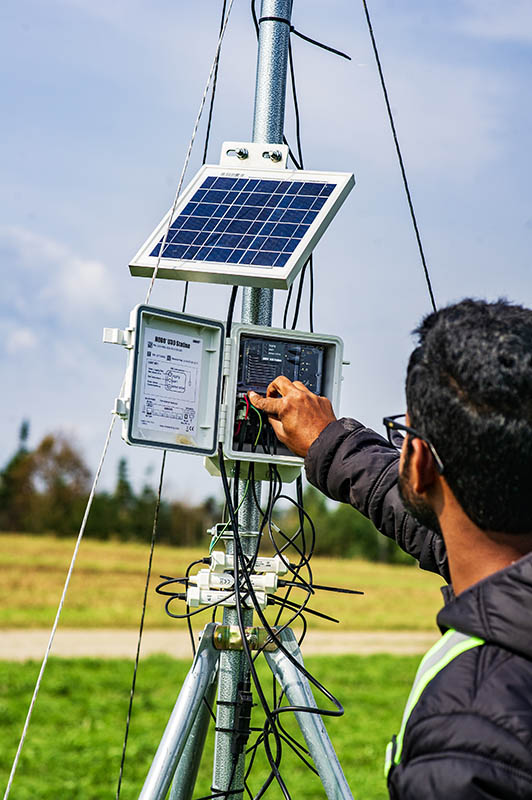
Tharindu Kulasinghe (PhD candidate) inspects weather station at the forage field in Cormack
At Grenfell Campus, the research team is led by Dr. Mumtaz Cheema, who works with seven faculty members to supervise 12 graduate students on different aspects of the project. Over the summer, graduate and summer students, led by the research coordinator and liaison, Dr. Yeukai Katanda, worked with host producers Ian Richardson and Melvin Rideout to establish experimental fields in Cormack. Throughout the growing season, students monitored crops and routinely collected soil, plant, and gas samples.
Continued engagement with external partners to evaluate and communicate research updates is done through activities such as meetings, retreats, field days. Graduate students attended the annual meetings of the NLFA and presented some of the preliminary data on posters. At this event, students also managed to network with producers. More notably, the research team (Grenfell and DFFA members) held a one-day retreat at the CRI to share research updates, evaluate progress, and plan together.
As Newfoundland and Labrador's only university, Memorial has a special responsibility to the people of this province. Researchers at Grenfell have built a strong track record of mutually beneficial research relationships with rural communities in western Newfoundland and beyond. But building relationships takes time and often isn't recognized or rewarded in the same way as research outputs like theses or journal articles.
The Sustainable Rural Communities Initiative (SRCI) is hoping to change that. An interdisciplinary group of researchers has been working since 2021 to establish more dedicated capacity for applied research in rural communities and academic programming to train a new generation of engaged scholars at Grenfell. The SRCI is building on the success of the Certificate Program in Sustainable Rural Communities in the School of Arts and Social Science, launched in 2022 with an innovative model that brings together traditional university students with adult learners working in rural community development. From this foundation, the initiative is developing a proposal to create new graduate programs in Sustainable Rural Communities and secure funding to ensure capacity to deliver the new programs.
SRCI hopes to provide much-needed capacity to deepen the relationships that researchers at Grenfell have built with the people and organizations who are working hard to sustain their rural communities.
For example, Joan Simmonds of Conche on the Great Northern Peninsula has run the French Shore Interpretation Centre since 2000 and was one of the creators of the famous French Shore Tapestry. Joan has been involved in a number of applied research projects over the years, from a social network analysis of regional economic development in 2015 to co-authoring a journal article in 2021 on the power of stories for rural sustainability. Joan is also completing the Certificate in Sustainable Rural Communities, which she has taken remotely from Conche.
Now, Joan is exploring a collaboration with Transdisciplinary Sustainability PhD candidate Sara Langer on the role of art in community transformation, learning from the French Shore Tapestry and other engaged arts initiatives.
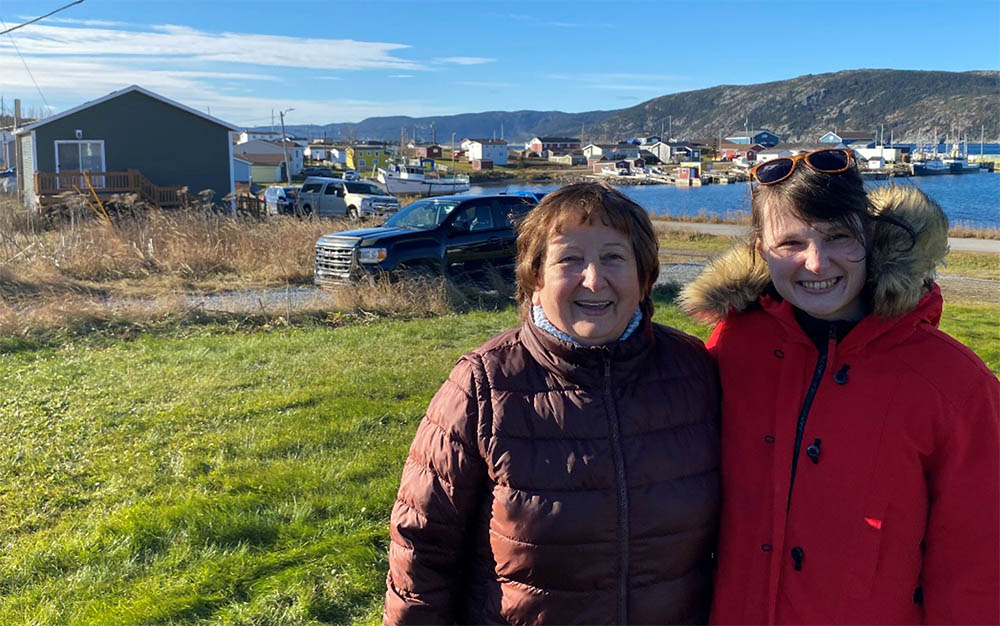
Joan Simmonds (Manager of French Shore Interpretation Centre) and Sara Langer (Transdisciplinary Sustainability PhD candidate) in Conche, November 2024
"To have the presence of a university in a small rural community, where people can actively see students engaged in the community, is the greatest partnership and asset that a non-profit organization with a goal to create sustainability could possibly achieve!" - Joan Simmonds, Manager of French Shore Interpretation Centre.
Relationships with community leaders like Joan take time, money, and commitment to sustain, and the process is just as important as the outcomes. The proposed graduate programs and funding would enhance Grenfell's capacity to support researchers to invest in relationships with the rural communities that make our region so unique. The SRCI has also been working with the Grenfell Office of Engagement and the Harris Centre to ensure that this effort would strengthen the university-community engagement capacity already in place.
For any questions about the Sustainable Rural Communities Initiative, please contact Brennan Lowery at bclowery@mun.ca.